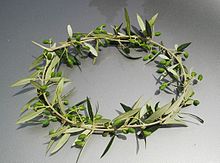Kotinos
The Kotinos ( Greek κότινος ) was the winning prize at the ancient Olympic Games . It consisted of branches of the wild olive tree , which was also called kotinos .
It is often wrongly assumed that the winners of the Olympic Games were presented with a laurel wreath in ancient times . For example, the Greek President Konstantinos Stefanopoulos publicly honored the Greek athletes with laurel wreaths on their return from the 1996 Summer Olympics in Atlanta . In fact, however, ancient authors report that the prize for the winners of the Olympic Games consisted of olive branches: In his comedy The Wealth, Aristophanes makes fun of the fact that the god Zeus has nothing better to offer the winners of the games organized in his honor than an olive wreath . Herodotus, on the other hand, reports that the Persian Tigranes had the greatest respect when he heard that the Greeks did not take part in the competitions because of the prospect of a cash prize, but solely because of an olive wreath and the fame associated with it. Phlegon von Tralleis reports that there were no wreaths at the first five Olympic Games; then the oracle of Delphi was asked and the answer was that the laurel wreath should be made from branches of the wild olive tree. Pausanias attributes the tradition of the olive branch as a prize to the fact that Heracles , who is said to have founded the Olympic Games and introduced the olive tree to Greece, wreathed the winner with olive branches after a race against his brothers.
The Olympic Games differed from the other Panhellenic Games in their kotinos , which each used a different plant for the award ceremony: pine in the Isthmian , celery in the Nemean and laurel in the Pythian Games .
literature
- Michael Blech: Studies on the wreath among the Greeks (= attempts at religious history and preliminary work. Volume 38). De Gruyter, Berlin 1982, ISBN 3-1100-4157-X .
Individual evidence
- ↑ http://www.olympic.org/content/Olympic-Games/All-Past-Olympic-Games/Summer/Athens-2004/Athens-2004-Collection/
- ^ Liddell-Scott-Jones , A Greek-English Lexicon .
- ↑ Laurel wreath for successful Greeks. In: The world . August 8, 1996, accessed November 24, 2012 .
- ↑ Aristophanes : The Wealth 585-591.
- ↑ Herodotus : Histories 8, 26.
- ↑ Fragments of the Greek Historians 3, 603–604.
- ↑ Pausanias : Description of Greece 8, 48, 2; 5, 7, 7.

